Daniel develops his technical skills with Colorifix

Daniel Richardson, a student based at the John Innes Centre, wanted to gain a greater understanding of how software is developed and deployed to solve real world problems and get experience with popular and industrially relevant software packages. After engaging with Colorifix at the Employer Forum, Daniel felt this would be a good fit for him and arranged to undertake his PIPS with them.
Due to the COVID pandemic, Daniel worked from home but had daily remote meetings with the rest of the team. Daniel liked the positive team dynamic with use of ‘slack’ messaging to schedule quick meetings to discuss any problems or challenges.
There were several potential placement projects defined by the company, but Daniel was interested in software development. Based in the informatics team, his project aimed to develop software that would enable the company to predict and identify biosynthetic gene clusters in micro-organisms that are responsible for colour pigment development. “I developed Python algorithms for running software tools of interest, and extracting relevant data”, explains Daniel. This code was deployed using Docker, along with an in-house database infrastructure.
Daniel was required to develop new skills quickly, in order to keep pace with the company’s priorities. The Informatics department were very proactive in offering support, pointing him towards relevant information sources, and checking on his progress. This gave him the confidence to grow as a developer and meet the challenges he was presented with.
Daniel feels his technical skills developed with specific aspects of software development. Daniel reflected on the intense nature of work within a start-up but felt as an intern he was given more flexibility for his project. He recognised the ‘agile’ working environment, valuing intellectual creativity to develop products/applications and recognition of individual outputs. He gained insight into wider aspects of the company, joining the weekly meetings of the Microbial Engineering team, and saw the fast-pace of R&D in a company. He feels he has greater awareness of how start-ups work from twice monthly company-wide meetings that included the marketing and finance teams.
Daniel’s communication skills improved as he had several opportunities to present his work to the rest of the company, which helped him to improve his ability to convey his research to non-specialist audiences.
Daniel has a passion for problem-solving so feels he may fit better within industry rather than a long-term academic career that would ultimately take him away from practical research to strategy/financing research. “One of the most enjoyable but challenging aspects of my PIPS was the rate at which new skills had to be assimilated in order to keep pace with the company’s needs”, reflects Daniel.
In terms of Daniel’s career development, he has gained valuable experience using software packages such as Docker, Git and Neo4J, which are often cited as desirable skills for programming jobs. Through being involved in company meetings, he gained an insight into the recruitment process, and he found it useful to hear about the criteria that prospective candidates were assessed against, and what sort of roles were becoming available in a growing company. This all made the internship a very positive experience.
Daniel advises future PIPS students to be proactive in getting to know people, as there’s always a chance that your role will be more cross-departmental than expected. It’s important to be honest about the skills you have (and don’t have). “Industry tends to be more focussed on agile working practices than academic research, so try to get into the habit of assimilating new information quickly, setting and meeting achievable goals, and asking questions if you’re unsure how to proceed”, says Daniel.
To read more about Daniel’s placement you can look at the Colorifix blog post here.
